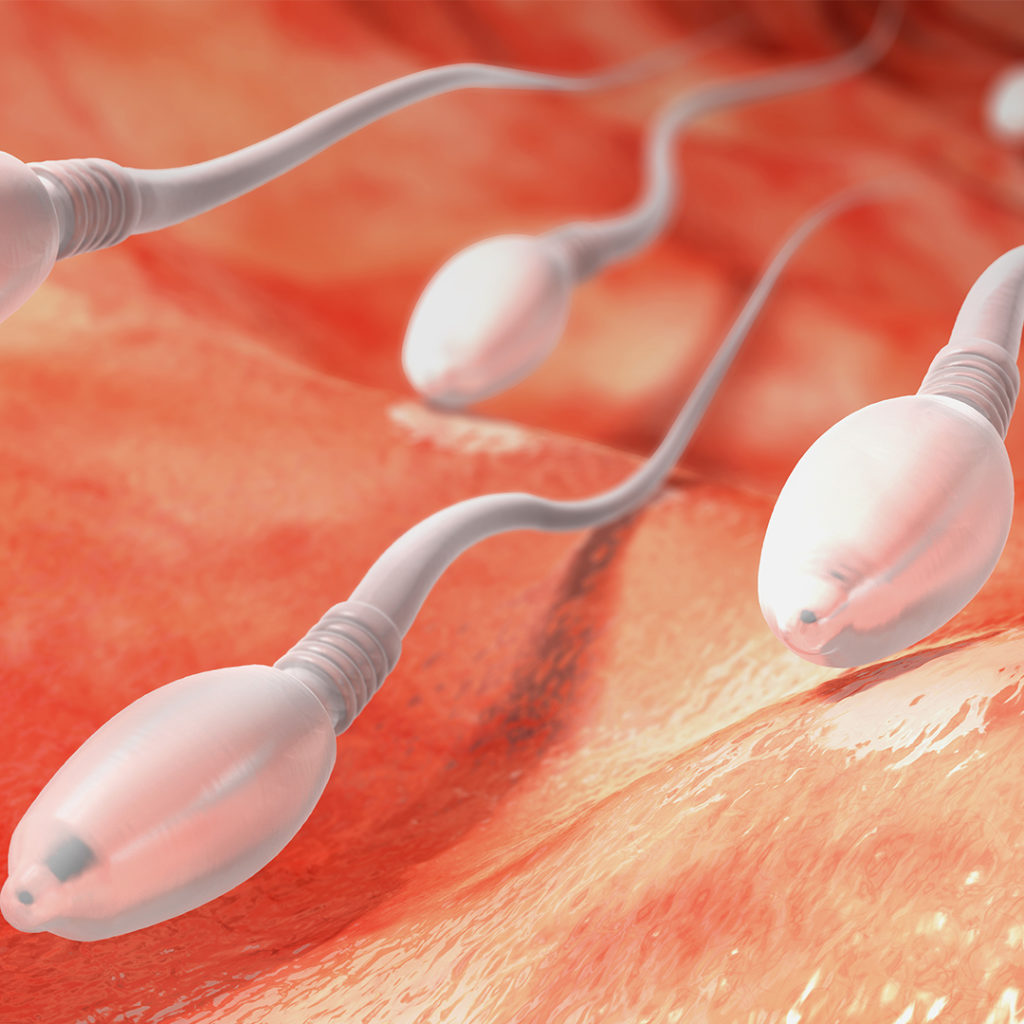
Male infertility is a big deal. It’s very taboo, and all too often the assumption is that when a couple has problems conceiving a baby the woman is the cause of the problem. That’s just wrong, and it causes a lot of problems, wasted time and heartache for couples trying to get pregnant. It is so very important to get the facts out there and lift the stigma surrounding male infertility.
That stigma is all tied up in misguided ideas about masculinity and manhood. It’s very difficult for many men to even approach a doctor to discuss male infertility. When they are diagnosed, they are consumed with feelings of inadequacy, guilt, shame, and loneliness.
The truth is, male infertility is a medical issue like any other!
Infertility in general is far from uncommon. Getting pregnant is difficult for around one in every six couples who want a baby. What people need to begin understanding is that, for many of these couples, the cause will be found in the man.
Male Factor Infertility
This is what we call “male factor infertility.” Something about sperm production, sperm numbers, sperm quality or getting the sperm into the right location, is lowering the chance of a pregnancy.
Around the world about one third of infertility is caused by a male issue. In Trinidad and Tobago, where our clinic is located, the story is a little different. A recent study here has shown that the number one cause of infertility in our Caribbean island is male factor. Many doctors do not know this fact. In fact, surprisingly few people know about male infertility at all! A common medical mistake is to offer infertility tests to the woman only and forget about the man entirely.
The startling truth is that it is harder for men to become fathers today than it was a generation ago. Another international study shows that sperm counts have declined by almost 60% in less than 40 years. Medicine is finally catching up and the shocking lack of research into the causes, tests and treatments for male infertility is now catching up with the work done on female infertility.
Doctors are catching up as well with the knowledge that a sperm test alone often doesn’t give you the full picture and that men deserve a full assessment with a review of all the possible factors that can affect a their fertility before resorting to assisted reproductive therapies like insemination and IVF treatment.
Is male infertility a medical problem?
Let’s look at the reasons behind male infertility. There are many. You will see that male infertility is a medical problem. There are many ways a fertility doctor can fully assess a man to understand his fertility issues. There are also a range of good medical treatments available for male infertility.
So what causes male infertility?
Many people who visit our clinic have very little idea about how sperm make a baby. To understand the causes of male infertility, you need to know some basic information. How sperm are produced, how they get to the right place and then how they fertilise the egg. Then the root cause of male infertility becomes clear.
Causes of male infertility: Sexual Function
Here’s how it all works: Right at the beginning of the process, sperm need to be ejaculated into the vagina. Some couples have a problem here: Erectile dysfunction or difficulty getting or maintaining an erection can cause infertility.
ED or erectile dysfunction is a common problem that can affect couples from time to time. More than 50% of men will experience it at some point. When it occurs most of the time, infertility is common. ED can be caused by medical conditions such as diabetes. Checking the man’s medical history carefully and doing some simple blood tests can identify these causes of male infertility.
Some couples have other types of sexual difficulty. There are many ways to have a fulfilling sex life and not all of them will lead to a pregnancy. For some people penetrative sex, where the penis goes into the vagina during sex, is impossible.
Sperm Problems and Male Infertility
Most people know that sperm must get to the egg to make a baby. To get to the egg, sperm need to be good swimmers. High numbers of sperm are also needed. The woman’s reproductive tract (vagina, cervix, uterus and fallopian tubes) is designed to kill off as much sperm as possible so that only the really good sperm get near the egg. Forty million sperm or more are needed in the vagina to get through the woman’s sperm-killing environment.
Low sperm numbers will cause infertility. With low sperm numbers, we check a male hormone blood profile, along with a thorough medical review. In around one in 10 men we will find that their diet, alcohol use, medications or medical condition could be affecting their sperm. If this is the case, we can help them make some simple changes to improve fertility.
Very occasionally we find a medical hormonal problem in men causing sperm problems. In those rare cases, about one in every 800 men or so, the blood test may reveal a treatable condition, like a high oestrogen or prolactin level, that might respond to medication. More often this blood test will show a high FSH and low testosterone blood level, which leads to a diagnosis of testicular failure. If this is the case, tablets and injections are a waste of time and money.
Men with testicular failure need fertility treatments like insemination (IUI) and IVF with ICSI (in-vitro fertilisation and sperm injection) to try and get a baby with the little sperm they are still able to make. Some of these men do not have much time left, and will soon stop making sperm altogether, so for those with worrying blood test results we recommend sperm freezing.
Poorly swimming sperm are common. Infertility is likely for the man when less than 40% of the ejaculated sperm are good swimmers. The reasons for poorly swimming sperm are unknown, but may include genetic causes.
Even with a normal sperm, infertility may be a male issue.
Most people don’t know that a sperm test can show great swimming and numbers and yet the sperm can still be the problem. Doctors without fertility training often make this mistake. Every week I hear a patient say that a previous doctor, not fertility trained, has told them their sperm is fabulous, when in fact a simple fertility review shows that there is clear male factor infertility.
What you need is a thorough assessment of all aspects of the man’s fertility. This includes a full medical history review and two sperm tests. One sperm test may miss the problem. Sperm counts can vary for some men and a second sperm test may show problems with the sperm that were missed before.
Sometimes it is the shapes of the sperm that show a problem. The causes of problems with sperm shapes are poorly understood. What’s more, poorly shaped sperm cause infertility issues in some men, while in others it does not seem to.
For some of these men we also offer more detailed and specialised sperm tests that look at the quality of the sperm. These detailed sperm tests, including Sperm DNA Fragmentation testing, can reveal previously hidden causes of infertility on the man’s side. Sperm quality tests can also reveal an issue in the man where the sperm might cause a miscarriage or extremely low chances of having a baby with fertility treatments.
Male Infertility can arise when there’s no Sperm at all.
There is no disagreement about the cause of male infertility when a sperm test shows no sperm are present. This is surprisingly common: One in every 15 to 20 men doing a sperm test have no sperm. When two sperm tests show no sperm consistently, it means that man is extremely unlikely to get a baby without expert fertility help.
Men who have no sperm when they ejaculate need expert testing to diagnose the cause before choosing a treatment. The cause can be a blockage in sperm release or a problem with sperm production. Thankfully, we no longer need to do an invasive test like a testicular biopsy to work out what the problem is. These days a fertility doctor can diagnose the problem with blood tests and ultrasounds. We also have genetic tests that can show the cause.
If there is a blockage to sperm release, then a simple surgical procedure to find sperm tin the testicles is advised. This surgical retrieval of sperm from the testicles is often successful and can find sperm production. This sperm must be frozen and can then be used to make a baby with IVF and sperm injection in the future. Sperm injection techniques are so advanced that, amazingly, we only need a couple of live sperm these days to make a baby!
A word of caution here for patients. You absolutely should not have this procedure done unless your doctor can freeze the sperm for you. It is not acceptable to have the surgery done, find sperm, and not have it frozen for you. If this happens, you will then need to repeat the surgery again to freeze the sperm. Always make sure that your doctor can freeze sperm for you before any fertility surgery or procedure on the testicles.
If the problem is sperm production, then the next step is to find out whether there’s a medical condition causing it. Genetic tests are available to show a man where a change in one of his genes controlling sperm production is the culprit.
Getting to the root cause of male infertility is not always easy.
As you can see there are many different causes for male infertility. In some men we can identify the underlying cause. But for many other men, even with excellent fertility doctors, we are still in the dark about the cause of their infertility. The good news is that, even in these cases, there are many successful fertility treatment options for male infertility.


